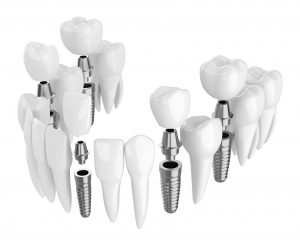Should I go to a free cosmetic dental consultation?
What to Expect at the Initial Consultation
If you are interested in having implants done, you will need to attend an initial consultation with an implant dentist to discuss what you hope to achieve and get an idea of what treatment may involve.
Before the dentist can devise an appropriate treatment plan, he will need to examine your teeth to assess your current dental status in order to establish whether you are a suitable candidate for this type of procedure.
The dentist will look at a number of factors, including how many teeth are missing, whether the gums have shrunken or if there is any sign of disease, damage or decay, whether a broken or damaged tooth needs to be extracted, etc.
See what a dentist says about free consultations, are they worth it!
You will also need to undergo an x-ray or have a digital diagnostic image taken of your mouth.

This will allow the dentist to gauge whether your jawbone has suffered from any bone loss, whether the sinus cavities at the back of your upper jaw have collapsed as a result and to ascertain where there is any mechanical or medical problem present that might affect the success of any implant/s.
After viewing this in some detail, the dentist will be in a better position to judge whether you can go ahead with having an implant inserted or whether you first need to undergo a preliminary procedure such as a bone graft or sinus lift.
You may also be asked about some lifestyle and medical questions. This will further help to ascertain whether implants are the best option for you and whether they have any chance of long-term success.
After this, your dentist will outline his proposed treatment schedule for you to consider. At this point, the estimated costs, as well as any alternative options, will be presented to you. This may include the choice of materials used in your artificial tooth/bridge/denture, which can affect how natural they look and feel, as well as the price of the implant.
It will then be up to you to decide whether you would like to proceed and which course of treatment you prefer.
Implants are not always appropriate for certain patients. A number of things are contra-indicated for implant insertion.
These include:
- Having a compromised immune system due to a long-term illness, auto-immune disorder or steroid medication, since may mean that your body rejects the implant – much the same as your body might react after an organ transplant
- Heavy alcohol intake or being a heavy smoker as this can affect the ability of your gums and teeth to heal after the procedure
- Tooth-grinding conditions such as bruxism are likely to affect the ability of the implant to bind successfully with your jawbone and hold up the healing process. However, in some instances, a splint or mouthpiece can be prescribed to get around this problem
- Gum Disease – this has a serious impact on the success of an implant procedure and can lead to possible infection or implant failure. In the early stages, it can be reversed but must be eradicated prior to commencing with implant treatment. In the case of chronic gum disease that has progressed to periodontitis, there is likely to be extensive bone loss. This can prohibit the use of implants because of the poor long-term prognosis associated with this condition.
